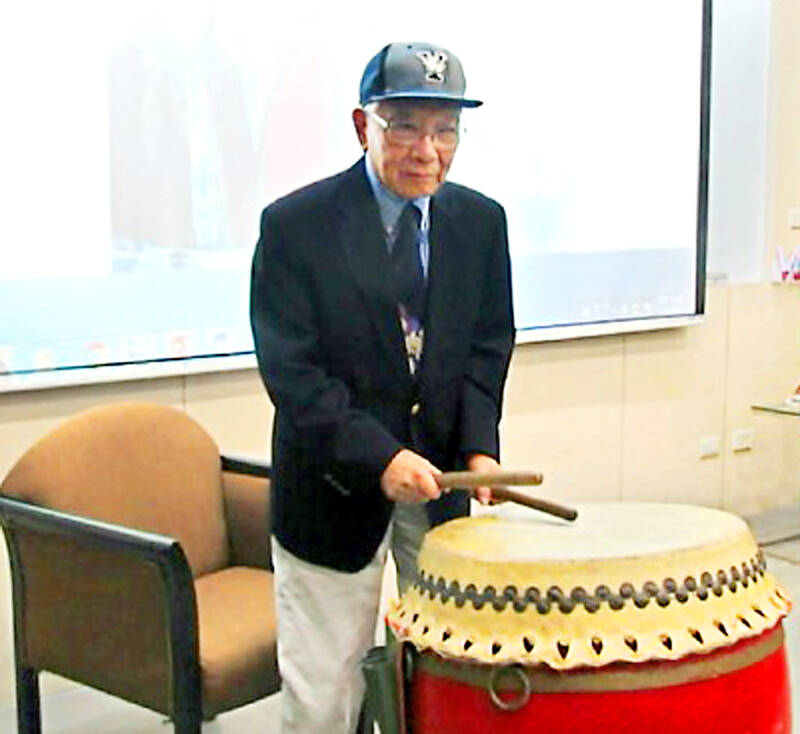Renowned Taiwanese poet Cheng Chou-yu (鄭愁予) passed away in the early hours of Friday at the age of 91.
Another local poet Hsiao Hsiao (蕭蕭) said yesterday that according to Cheng’s sister-in-law Lin Tsai-kuei (林彩桂), Cheng passed away due to heart failure.
Born in 1933, Cheng’s birth name was Cheng Wen-tao (鄭文韜). He was born in Jinan, Shandong Province in China, and his ancestral home was in Ninghe, Hebei. In 1949, he moved to Taiwan with his family following the Nationalist government’s retreat to the island.

Photo: Taipei Times
In 1967, Cheng went to the United States to participate in the University of Iowa’s International Writing Program, later earning a Master of Fine Arts degree and doctoral degrees.
He taught at the University of Iowa, Yale University and the University of Hong Kong, and in 2005 returned to Taiwan to serve as a writer-in-residence at National Dong Hwa University.
At the age of 16, Cheng self-published his first poetry collection, Straw Sandals and a Raft. He later published numerous poetry collections including Slave Girls Outside the Window (窗外的女奴) and The Possibility of Snow (雪的可能). His most famous poem, The Mistake (錯誤), is highly praised and often cited as a classic in Taiwanese literature. It was included in Taiwan’s Chinese language textbooks.
Cheng was also a frequent traveler, as demonstrated by a line in the Mistake: “I am a passer-by, not a returned man.”

The inspection equipment and data transmission system for new robotic dogs that Taipei is planning to use for sidewalk patrols were developed by a Taiwanese company, the city’s New Construction Office said today, dismissing concerns that the China-made robots could pose a security risk. The city is bringing in smart robotic dogs to help with sidewalk inspections, Taipei Deputy Mayor Lee Ssu-chuan (李四川) said on Facebook. Equipped with a panoramic surveillance system, the robots would be able to automatically flag problems and easily navigate narrow sidewalks, making inspections faster and more accurate, Lee said. By collecting more accurate data, they would help Taipei

TAKING STOCK: The USMC is rebuilding a once-abandoned airfield in Palau to support large-scale ground operations as China’s missile range grows, Naval News reported The US Marine Corps (USMC) is considering new sites for stockpiling equipment in the West Pacific to harden military supply chains and enhance mobility across the Indo-Pacific region, US-based Naval News reported on Saturday. The proposed sites in Palau — one of Taiwan’s diplomatic allies — and Australia would enable a “rapid standup of stored equipment within a year” of the program’s approval, the report said, citing documents published by the USMC last month. In Palau, the service is rebuilding a formerly abandoned World War II-era airfield and establishing ancillary structures to support large-scale ground operations “as China’s missile range and magazine

A 72-year-old man in Kaohsiung was sentenced to 40 days in jail after he was found having sex with a 67-year-old woman under a slide in a public park on Sunday afternoon. At 3pm on Sunday, a mother surnamed Liang (梁) was with her child at a neighborhood park when they found the man, surnamed Tsai (蔡), and woman, surnamed Huang (黃), underneath the slide. Liang took her child away from the scene, took photographs of the two and called the police, who arrived and arrested the couple. During questioning, Tsai told police that he had met Huang that day and offered to

A British man was arrested for attempting to smuggle 14.37kg of marijuana into Taiwan through Taiwan Taoyuan International Airport, Taipei Customs said late yesterday. The man, who arrived from Bangkok at 9pm on Friday, was asked by customs officers to open his luggage during a random inspection, Taipei Customs said in a news release. The passenger, whose identity was not disclosed, refused to open his suitcase and tried to flee the restricted area. He was eventually subdued by three customs officials and an Aviation Police Bureau officer. A later search of his checked luggage uncovered 14.37kg of marijuana buds. The case was handed over